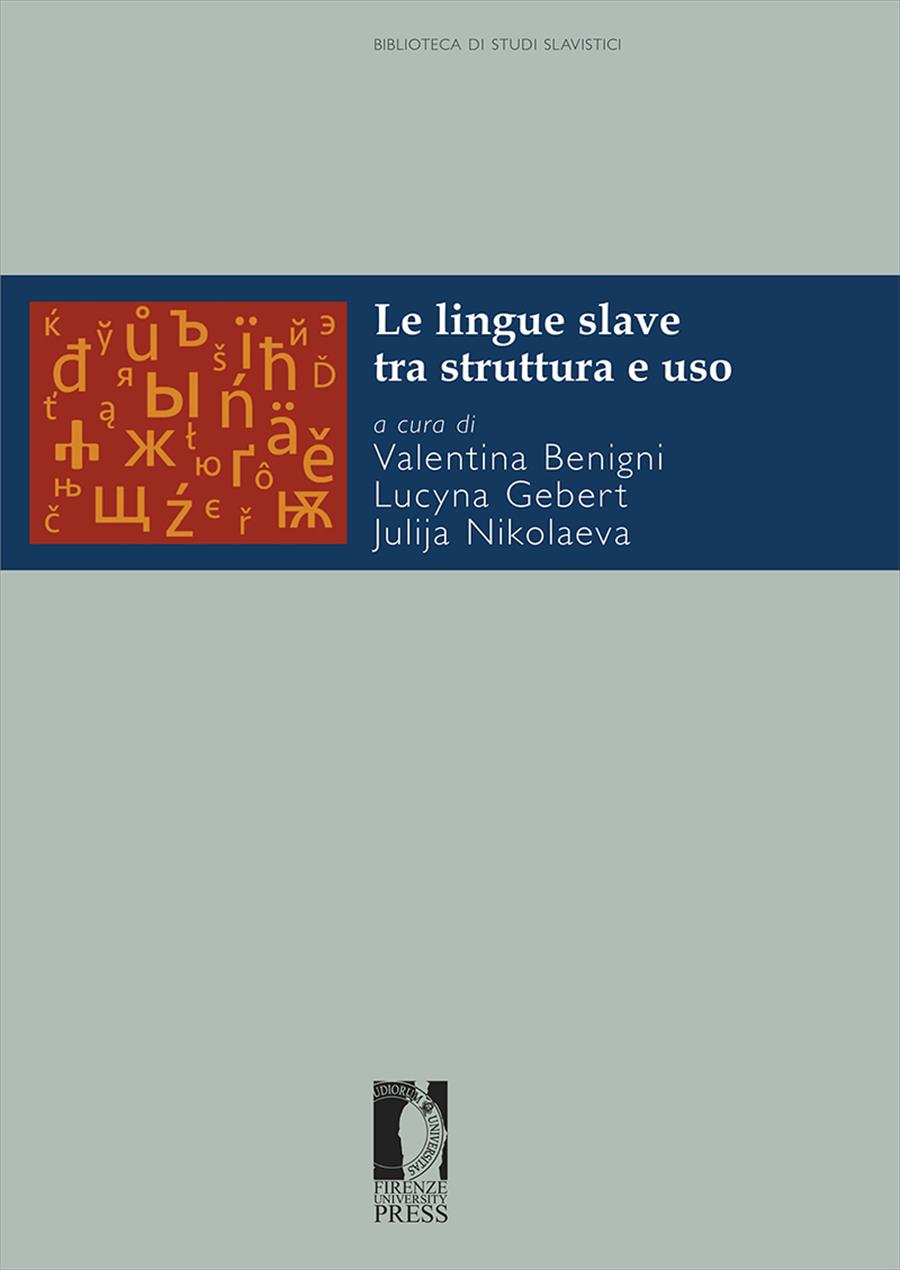- Le lingue slave tra struttura e uso
- Edited by Valentina Benigni, Lucyna Gebert, Julija Nikolaeva
1, 1000, 100.000. Quanti e quali attori nei costrutti personali indeterminati?
- Francesca Fici
- Natalia Žukova
- © 2016 Author(s) |
- CC BY 4.0
- DOI: 10.36253/978-88-6453-328-5.07
The aim of this article is to suggest a reflection on the indefinite-personal sentences of Russian. After a discussion of the properties of these sentences (1), we consider the grammatical and semantic characteristics of their components and especially of the null subject (2). In section (3) we consider which verbs occur more frequently in these sentences and in (4) the relationship among the different components of the indefinite-personal sentences. In (5) we conclude by briefly introducing the Italian sentences that most frequently correspond to Russian sentences of this type.
- Keywords:
- Russian Language,
- Indefinite Personal sentences,
- Null Subject,
University of Florence, Italy
University of Florence, Italy - ORCID: 0000-0003-1176-1609
- Boldyrev A.N. (1998) - Osadnaja zapis’ (blokadnyj dnevnik), Sankt-Peterburg.
- Bulygina T.V., Šmelev A.D. (1997) - Jazykovaja konceptualizacija mira (na materiale russkoj grammatiki), Moskva.
- Cinque G. (1999) - Adverbs and Functional Heads. A Cross-Linguistic Perspective, Oxford-New York.
- Fălăus A. (2013) - Broaden Your Views, but Try to Stay Focused: A Missing Piece in the Polarity System, in I. Caponigro, C. Cecchetto (eds.), From Grammar to Meaning, Cambridge, 81-107.
- Gladkov A. (2014) - Dnevnik, “Novyj mir”, 1-3.
- Matsuoka M. (2013) - On the Notion of Subject for Subject-Oriented Adverbs, “Language”, LXXXIX.3, 586-618.
- Mel’čuk I.A. (1974) - O sintaksičeskom nule, in A.A. Cholodovič (ed.), Tipologija passivnych konstrukcij. Diatezy i zalogi, Leningrad, 343-361.
- Nikitina E.N. (2011) - Neopredelenno-ličnye predloženija. Materialy dlja proekta korpusnogo opisanija russkoj grammatiki, Мoskva, cf. <http://rusgram.ru/Неопределенно-личные_предложения> (ultimo accesso: 15.03.2015).
- Padučeva E.V. (1985) - Vyskazyvanie i ego otnošenie k dejstvitel’nosti (referencial’nye aspekty semantiki mestoimenij), Мoskva.
- Padučeva E.V. (2012) - Neopredelenno-ličnoe predloženie i ego podrazumevaemyj sub’’ekt, “Voprosy jazykoznanija”, 1, 27-41.
- Peškovskij A.M. (1956) - Russkij sintaksis v naučnom osveščenii, Мoskva.
- Richtarcikova v. (2013) - Ignorance and Indifference: Epistemic Indefinites in Slovak, Barcelona.
- Šeljakin M.A. (1991) - O semantike neopredelenno-ličnych predloženij, in A.V. Bondarko (ed.), Teorija funkcional’noj grammatiki. Personal’nost’. Zalogovost’, Sankt-Peterburg, 62-72.
- Švedova N. (ed.) (1980) - Russkaja grammatika, II, Moskva.
- Testelec Ja.G. (2001) - Vvedenie v obščij sintaksis. Мoskva.
- Žerebcova P. (2011) - Dnevnik Žerebcovoj Poliny, Moskva.
Chapter Information
Chapter Title
1, 1000, 100.000. Quanti e quali attori nei costrutti personali indeterminati?
Authors
Francesca Fici, Natalia Žukova
Language
Italian
DOI
10.36253/978-88-6453-328-5.07
Peer Reviewed
Publication Year
2016
Copyright Information
© 2016 Author(s)
Content License
Metadata License
Bibliographic Information
Book Title
Le lingue slave tra struttura e uso
Editors
Valentina Benigni, Lucyna Gebert, Julija Nikolaeva
Peer Reviewed
Number of Pages
346
Publication Year
2016
Copyright Information
© 2016 Author(s)
Content License
Metadata License
Publisher Name
Firenze University Press
DOI
10.36253/978-88-6453-328-5
ISBN Print
978-88-6453-327-8
eISBN (pdf)
978-88-6453-328-5
eISBN (xml)
978-88-9273-230-8
Series Title
Biblioteca di Studi Slavistici
Series ISSN
2612-7687
Series E-ISSN
2612-7679
